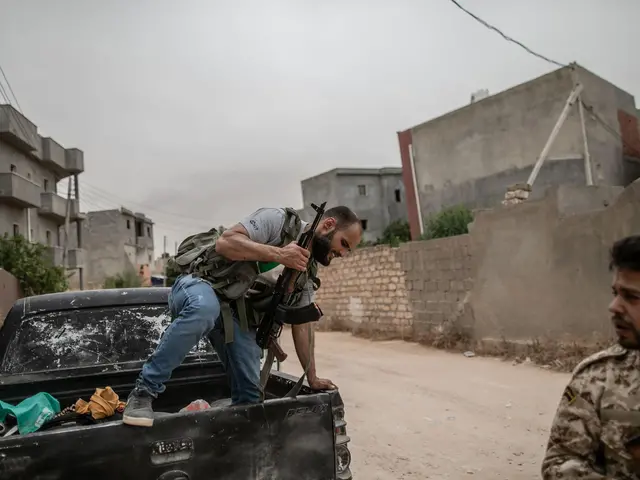Russian top officials postponed a visit to Turkey at the last minute on Sunday, highlighting their differences on the Libyan conflict, where the two countries have taken a lead in efforts to find a solution to the oil-rich nation's near decade-long conflict, analysts said.
Meetings with Russian Foreign Minister Sergei Lavrov and Defense Minister Sergei Shoigu planned in Istanbul will take place "at a future date," Turkey's Foreign Ministry said on Sunday, a day after announcing that the two ministers were set to come for talks.
The Foreign Ministry in Moscow separately said the two sides are "actively working to support a settlement in Libya." No reason has been mentioned for the cancellation of this meeting where Libya was supposed to be the main focus.
Experts think that recent gains in Libya by Turkish-supported forces lay at the core of tensions amid statements from the United Nations that warring sides had begun new peace talks.
"This last minute cancellation is the signal of problems in Libya where Turkey has upped it stakes after recent battle victories on the field. It seems that Turkey's hand is stronger than before compared to Russia," Oytun Orhan, coordinator at the Ankara-based Center for Middle Eastern Studies (ORSAM), told Xinhua.
Ankara and Moscow support opposing sides in civil wars in Syria and Libya. Ankara is providing military and diplomatic support to Libya's United Nations-recognized administration, the Government of National Accord (GNA), while Russia backs rival militia commander Khalifa Haftar.
In Syria, the Russian-backed government aims to retake northern province of Idlib from Islamist militants, while Turkey has vowed to never let that happen, sending thousands of troops there to protect its national interests and avert a new influx of refugees on its soil.
"Turkey doesn't seem ready to any concessions in Libya where its hand is stronger now with battleground gains around the strategic town of Sirte," indicated Orhan.
Russia, on the other hand, he said, is trying to force Ankara to a compromise in Libya by using the Idlib card, organising air raids against Turkey-backed forces positions in northern Syria, Orhan stressed.
"There is an ongoing arm wrestling between Russia and Turkey in Syria and Libya," argued this expert, emphasizing that he doesn't expect these tensions to simmer in both war theaters into a direct confrontation.
In recent months, Russia and Turkey have taken the lead in efforts to find a solution to Libya's crisis, hoping in the process to carve out spheres of influence for themselves in the North African nation.
Turkish support for the GNA has allowed it to turn the tide and repel a year-long offensive by eastern-based renegade commander Khalifa Haftar, which Russia, the United Arab Emirates, and Egypt back.
The postponed Istanbul talks were supposed to broker a deal which would pave the way of a ceasefire in Libya.
This is not the first time that Russia and Turkey have attempted to broker a ceasefire in Libya, but this time with the United States showing interest to support its NATO ally, Turkey, in the oil-rich nation.
In January, GNA Prime Minister Fayez al-Sarraj and Haftar visited Moscow as part of Russian-Turkish efforts to secure a lasting ceasefire. However, Haftar, bolstered by his battlefield successes at the time, refused to sign the agreement.
The Moscow meeting was followed a week later by a separate summit, this time hosted by Germany.
Turkey's prime motivations for entering the war in Libya was a contentious maritime border demarcation agreement it signed with the GNA that expanded its Exclusive Economic Zone (EEZ) in the resource-abundant eastern Mediterranean.
Several European nations have opposed Turkey's Libyan ambitions. France escalated over the weekend its stance towards Ankara in Libya, saying that it is "acting in an unacceptable way by using NATO, and France cannot tolerate this."
Observers think that both Ankara and Moscow have to make concessions at further stages in Libya to secure their gains and prevent an escalation of tensions that would be detrimental to both sides.
"Conditions have drastically changed in the Libyan theater since January and it's very obvious that Turkey and Russia should engage in a new round of talks if they intend to renew their joint commitment for peace and stability of Libya," political commentator Serkan Demirtas told Xinhua.
The GNA, backed by Turkey's military and drones, remarked this expert, is continuing its advance to gain the control of Sirte and al-Jufra airbase. It wants to expand its control along the shoreline and around the Oil Crescent to further consolidate its military gains. It won't likely stop until these objectives are met.
Nevertheless, Demirtas insisted that a renewed Turkish-Russian political dialogue seems to be the best solution to reach peace in Libya. "Just like in Syria, there is no military solution to the Libyan question either," he added.
 简体中文
简体中文

